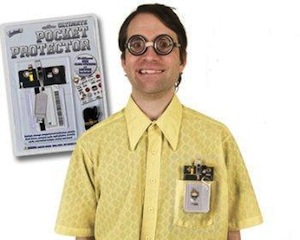Is it weird for me to post on our blog about engineering?
Aside from our production staff of assembly elves who busily and fabulously make Cubelets, our largest staff contingent is Engineers, and I’m not on it. We have firmware, hardware, mechanical, electrical, and software engineers. I share an office with several of the Modular Robotics engineers, but I keep my feet firmly planted in “Education.” Still, today, I want to say a bit about engineering.
In my early life, I was the child of an engineer. A lot of people think of engineers this way:
 And, don’t get me wrong, we did have quite a thing about graph paper, mechanical pencils, and protractors in my house growing up (most memorably, when designing Jack-o’-lantern faces in October). But my strongest memories of absorbing engineering by osmosis have a lot more to do with being asked to make a deliberate practice of defining a challenge and naming possible solutions – in my homework, in the kitchen, and in how we did chores and laundry and leaf-raking.
And, don’t get me wrong, we did have quite a thing about graph paper, mechanical pencils, and protractors in my house growing up (most memorably, when designing Jack-o’-lantern faces in October). But my strongest memories of absorbing engineering by osmosis have a lot more to do with being asked to make a deliberate practice of defining a challenge and naming possible solutions – in my homework, in the kitchen, and in how we did chores and laundry and leaf-raking.
I’ve read scary statistics about workforce readiness and the state of our education to prepare students to be innovators, problem solvers, and engineers. things like, At the current growth rate of engineering jobs we will produce only one-third of the engineer educated students we need to fill those jobs in 10 years. I’m not sure how to verify the accuracy of these numbers, and of course, they depend on a lot of multi-variate and ever-changing factors.
I suspect the point of these statements is to get us all thinking about what we can do differently for our children and students and schools. So, on that criteria, this statement works for me. I thought about how privileged I was to grow up with engineering in my life, and indeed, my home. I also realized how awesome it is to work here surrounded by engineers and to be reintroduced to the language and unique problem solving processes engineers use. (It’s not uncommon to hear our staff saying “Can we pursue a solution that gets around that constraint? or “How can we reverse engineer that?” about non-engineering challenges.)
And I went away and, with the help of a four amazing collaborators from Science Matters, wrote the first installment of an Engineering and Design Principles unit! Students can learn valuable engineering approaches from making robots, and while we’ll add more lesson plans to this unit in the future, I wanted to get it out there now and see what teachers, camps, and clubs thought if it. Enjoy this collection of 5 lesson plans (soon to be more!) individually, or as a progression and unit of learning to introduce engineering as a cool way of approaching science and design together with your students – and be sure to let us know what you think!

